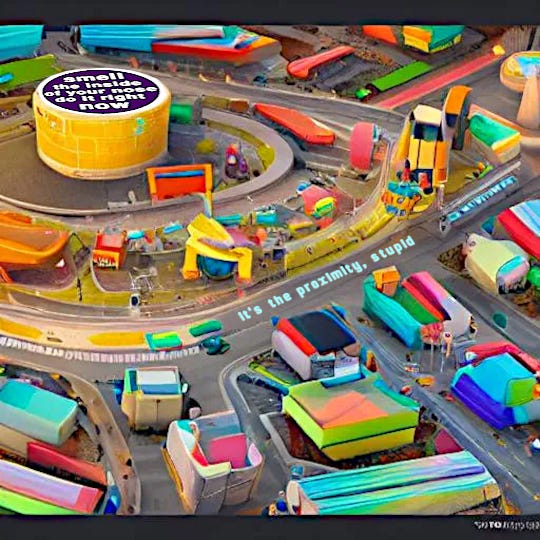Over the years of corporatism there has been a loss in the sense of value for proximal trade relationships, value exchange, or whatever you want to call business. The devaluing of service and community in exchange for a speedy personal experience creates cavernous social and economic gaps in the immediate proximity.
Can the way we look at things have an exponentially negative effect due to a narrative we project coupled with the cost of convenience? Is there an anti-consciousness dynamo happening there?
Following is some text I read during the podcast.
Written in 2013: I wrote a Character for a book. He was a retired professor. He would read his brief lectures on the local community radio station on Sundays. This is one of his little speeches.
Illusions in Economics vs. the Natural Phenomenon of Exchange
Business has become impersonal. This is obvious today. As a seeming corporate monstrosity has all but destroyed local free markets, people are losing touch with the reality that their actions have consequences.
Spatial relationships in the visible range of sight determine perspective. Television screens and economic reports are interpreted noises in the room.
Since we are not in direct contact with so many of the people we affect, we can tend to lose sight of how our decisions are real, powerful, and have an effect somewhere, even if it is not down the street where we can see it. Just as when we look down the street at our communities, we can see how economic treachery somewhere else, at some point, is affecting us here and now.
Regardless of the definitions and various systems that people use for these necessary activities, it comes down to the fact that what you enjoy in life is a result of business relationships. Everything you provide for your family and yourself are the results of a string of business-type relationships, even if you were not involved other than to purchase, or experience the outcome of that transaction. There was someone creating and someone producing in almost every object you see around you. Things got from point A to point B. People got paid, presumably.
When we think about that, we realize that taking business relationships for granted, or taking predatory approaches to income development, are very unhealthy methods of economics. This behavior is actually fraud, and technically, is not legal. If there were a valid protection system, honest business would thrive and those looking for those quick bucks would be floundering.
The self-interest of the selfish ends in self-destruction, and the destruction of relationships. The self-interest of the honest leads to legitimate exchanges and the fellowship of society. All you need to accumulate money is to know someone with access to the printing press, a good propaganda machine, and a couple of connections in government. What you need to accumulate real value is honest effort and skill, because like attracts like.
Eventually, what happens when people degrade themselves and society in abandoning value for currency accumulation is what is going on in our society today. The cynical, predatory, impersonal element has become contemptuous and fearful of a free flow of creativity, free enterprise, free-speech and openness. They have become untrustworthy and monopolizing, and now being accustomed to a level of income and a way of life, they can no longer maintain it honestly. They maintain it by instituting debt onto the very hardworking, honest people because they themselves have no value to add, and they maintain it through all manner of treachery besides.
End
I think that story has more relevance now than it did in 2013. Many more thoughts in the episode. Comments are always good.















Share this post